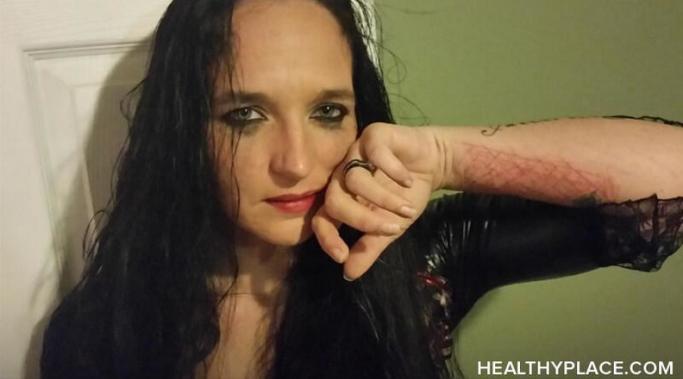I asked my Facebook friends what they wanted to know about borderline personality disorder (BPD). Someone asked:
"I'd like to know how does one discover or come to terms with being BPD? It took me years to learn of my depression, and I would assume one doesn't always know they have BPD - so how do they find out? And once they find out, then what?"
BPD Diagnosis
I once read a book by a homeless man, and he talked about the first thing his guru said to him: "Everything that happens to you is for your own good."
As a rape survivor, I argue with this, but it stood out to me. My version would be "Everything that happens to you is to teach you something." I recently learned a major fact about my BPD diagnosis from a woman at the bus stop.
The good news is there is hope. BPD is treatable. However, it is useful to know if you fall into a subtype in order to better communicate with your mental health professional. You may not know where you fall, and you may not fall into one of those categories--that's okay. What's important is that you understand your diagnosis, in order to improve the outcome of treatment.
Borderline personality disorder does get better if you work at it. You are worth the wait.
Some people believe that the term "borderline" is stigmatizing and inaccurate. Should BPD be renamed? If so, what should it be called?
Schema therapy shows tremendous potential for treating borderline personality disorder (BPD). In this video, More Than Borderline's Becky Oberg explains domains, which are related to basic childhood needs, and the schemas that can form if those needs are not met.
"When she feels one emotion strongly enough, she doesn't know it's possible to feel any other way." That's the mind of a suicidal person. ... Someone once said "Every suicide is a double homicide." After losing a loved one to suicide, the survivors may feel like they died, too.
Rapunzel! Rapunzel! What can the woman in your hair teach us about borderline personality disorder (BPD)?
As a villain, Mother Gothel in Disney's Tangled is unique. She's not motivated by revenge, greed, or lust for power. Gothel, terrified of growing older, is motivated by fear. As a result, she begins to display symptoms of BPD--to the point where she will literally die without Rapunzel and her magic hair.
I once heard that almost half of all people with schizophrenia have difficulty getting medical treatment for physical problems when their doctors are aware of their psychiatric diagnosis. Based on my experience, the percentage of this problem is much higher for people with Borderline Personality Disorder (BPD) and this is why having a patient advocate on your side may prove invaluable.
My name is Becky Oberg, and I have borderline personality disorder. I began self-injuring in college after witnessing an assault. I blamed myself for not being able to stop it—even though I’m a five-foot tall woman and would’ve been taking on two men, both of whom were about a foot taller. I began cutting out of guilt. I believed that if I hurt myself, I would learn to not fear pain, and if I did not fear pain, I could override it and take control of any situation--even one in which I could be seriously injured or killed.







